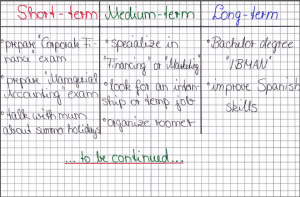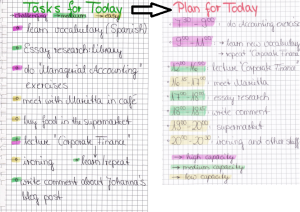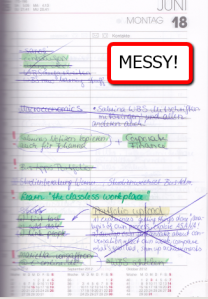“Hey, how was your weekend?”
“Very exciting! I celebrated the birthday of my sister and had a good night´s rest. And you?”
“Well, I started to prepare for the Corporate Finance exam.”
“How commendable! Have you progressed well?”
“Somehow yes. In the beginning, I had problems with computing the liquidity ratios and didn´t understand the concept of financial leverage as well as what the internal growth rate is. But now I even can calculate ROE by heart, isn´t that fantastic?”
“Well…are you kidding me?”
You know situations like that either?
You can swear to high heaven that you never have heard terms like “leverage” and “return on equity”?
You also repressed that you are going to write this exam in one week?
Well, then you are a typical student who has problems with time management. But don´t worry!
Because we are going to write our exams and essays soon, my last blog post is about work scheduling and why especially students have problems with organizing work in general.
The cliché about the “lazy student”
You may remember that day when you experienced the advantages of being a student. Sleeping late, visiting lectures of your interest, doing tasks at preferred times and partying even within the week. To sum up, you now have the possibility to organize your everyday life with regards to your preferences. If you don´t want to get up at 6am, nobody forces you to do so. You rather sleep two or three hours longer and do your homework after the lecture at university in the evening. As long as you accomplish all your tasks, you won´t have any problems.
However, this advantage of being a student also has two major disadvantages:
- You are not only able to organize your day loosely; you also have to do so!
- It is hard to accomplish your daily task affected by many distractions.
Personally speaking, I need lots of discipline to prepare the weekly exercises for the “Managerial Accounting”-lecture because we discuss them in class anyway. Additionally, I am not graded and nobody cares if I don´t have prepared anything.
However, it is important to deal with the tasks in advance to think about them on your own and to ask questions in class if you have had any problems.
But why do I have to be so disciplined?
Werner Stangl, Austrian psychologist, author and specialized in time management, knows the reasons:
“Students have to struggle with the following deficits and impacts which are very common:
- the effort to actually start working
- to deal with failures caused by ineffective work scheduling
- weak time management in general
Thus, the academic freedom requires a high degree of own initiative and self-discipline” he explains.
So what are his advices to us?
The “method of step-by-step specification”
To manage your tasks efficiently, you should define your goals and determine whether you accomplish them in the short-term, medium-term or long-term.
First of all, write down all your tasks and goals that come in your mind. After that, categorize them like in my personal example:
↓
Targets in the long-term are still a long way off. Thus you need some stopovers until you achieve them. They can be mentioned in the category “medium-term”. Other tasks in this column are characterized by being somehow important in the future, but not as urgent as “short-term” requirements.
In my table, I considered tasks like “preparing for exams” to be “short-term” because I am going to write them in July. On the contrary, “completing the bachelor degree” is a “long-term” goal which I can only achieve if I specialize in “financing or marketing”, which is a “medium-term” target.
Thanks to this “method of step-by-step specification” you are now able to estimate which tasks are now important to accomplish and what can be done later. Moreover, you profit by achieving stopovers because you are motivated again and again.
But how can I perform those tasks efficiently?
Werner Stangl has some advices for you.
Preferred working hours
“It´s up to you how you plan exactly” the psychologist says. “However, you possess a limited daily capacity. The efficiency of your working performance is depending on how alert you are. Therefore, different tasks require different degrees of alertness” Stangl continues.
This phenomenon is called “circadian rhythm” which consists in:
- 4 hours for accomplishing challenging tasks
- 4 hours for accomplishing medium-challenging tasks
- 2-3 hours for accomplishing easy tasks
According to the graph above, I should prepare for my exams between 9 and 11am because my capacity to learn is the highest. It would be “wasteful” if I rather talk with my mum about our holiday because this task doesn´t demand lots of attention and power. Therefore, I should perform this easy task between 1-2pm or later than 10pm.
As you see, the main challenge is to structure your day according to this circadian rhythm graph. Of course, every student has its individual level curve. I personally prefer to learn in the mornings as well whereas other students can work better in the evening. So you have to experience what your preferred working times are and then you plan your day according to these periods.
Between your “learning times” you should make a break or perform less demanding tasks.
Thus my personal plan would look like this:
Control yourself!
According to your personal plan you actually should learn chapter 3 in preparation for the exam. However, you´re doing the hovering and before that you started to write a shopping list. “It´s important to do the chores as well; I can learn later as well” you might think. But actually you just want to get around learning. Be aware of this danger called “procrastination”! Just control yourself and pull yourself together!
However, if you often feel like doing nothing challenging, you should rethink your plan. It might be more efficient if you learning earlier or later.
Prioritize!
If you have to write multiple exams one after another, you should decide whether you are able to pass all exams or not. It is important to do that decision before you start to learn because this affects your learning plan dramatically!
- “Yes, I can pass all my exams.”
Congratulations! You should start learning for your second exam before you write the first one. - “No, I cannot.”
In this case you should decide which exam is more important and align your plan with this specific focus.
Be aware of the following time consuming mistakes!
Internet in general
Mobile phone
Friends and colleges
“Small talk” in the library, cafeteria
Long walking/driving because of inefficient time management
“Procrastination” to plan your work, to start working, …
Continue working after breaks
Reading without taking notes
Inability to make decisions
Perfectionism
Be flexible!
Although you planned your preparation very well you should also add some buffer time in your plan. Otherwise you are not able to react flexible if you need some more time. It often occurs that something unexpected happens, for example that you cannot find a certain book in the library immediately. However, if you don´t use this buffer time in the end, you can finish earlier and you have more free-time than actually planned. Who will claim about this achievement? 🙂

Therefore, preparing a plan doesn´t mean that you have to stick to it at all costs! It is rather an essential orientation how your day will look like.
Personal Advices
I also experienced procrastination and failures caused by inefficient time management in the beginning. To eliminate this problem I bought a diary which additionally contains calendars and time of the day. This helps me to plan my everyday life more efficiently.
Up to now I organize the upcoming week every weekend having a coffee in this order:
- Collecting my tasks for today on an extra sheet of paper
- Estimate how much time I need to accomplish each of them
- Mark the events in my calendar which are important to attend (e.g. lectures)
- Organize when I do which task (e.g. in the morning before university)
- Check whether I didn´t forget to add free-time (e.g. to do sports)
I experienced lots of advantages with my new planning procedure:
+ No procrastination anymore!
+ I have more free-time because of realistic planning
+ I work more efficient because I experienced my “learning periods”
+ Things get done faster, e.g. chores
+ I have an overview about those things that I already finished: very motivating!
Unfortunately, there are also some problems:
– Reorganizing tasks looks messy because I always write with a pen (image)
– Carrying around my diary can be very annoying
– I am in trouble if I forget or lose it
All in all, I think that it is important that you plan your day somehow. You can do it with a diary, with Asana or you just remember your organization; it is up to you.
However, please structure your day realistically! Otherwise, you will experience procrastination.









Hey Lilmeu!
What a great post! You chose a topic that is so important for us, the students, but also for everyone else. We have our exams next week and you wrote down some very significant advices in your post!
Your post is very structured and the little subheadings support this as well. I really like your title, because it already in the beginning caught my attention. You also referred to an expert’s opinion, which is a crucial part of a blog post.
I really can see that you put a lot of effort and work into this blog post. All these tables and sheets that you developed on your own are very supportive for your topic and underline your arguments. I think that with this personal work you also bring personality into your post which makes your post even greater!
Well done, Lilmeu! This is an appealing piece of work and I will try to use your advice, not just for the next week, but also for organizing my life!
Hey lilmeu!
Thanks for this enriching last post of yours for this semester! I really enjoyed reading it. This topic applies to all of us since exams are right around the corner….the dialogue at the beginning is excellent!
You did not extensively report on other people’s observations and opinions, yet you gave us some very relevant tips for both uni and our future job. The scans of yours were also very useful to deliver your point.
Cool post! Thank you again. 😉
Mona
Wow this is fantastic, enlightening post. It’s so helpful for me personally, thanks so much for sharing!
Thanks Lilly for sharing your blog link with me. I have taken a look at it – well done. Thanks for posting this. Can I show your blog to our first year students? Louise Finland
Hello Louise. Thank you for reading our blog, I hope you enjoyed it! It would be great, if you can share our it with Finnish students because we are planning to bring fastexposure back to life again. Best wishes, Lilly